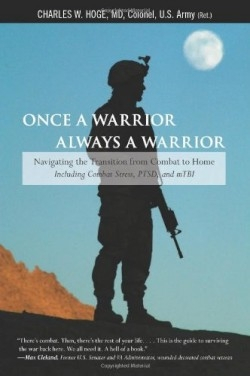Once a Warrior, Always a Warrior
Navigating the Transition from Combat to Home
- 2010 INDIES Winner
- Bronze, Psychology (Adult Nonfiction)
The difficult transition home from combat deployment is made more troublesome by society’s lack of understanding that the return to civilian life does not mean that one has given up identifying oneself as a warrior, says Dr. Charles W. Hoge, Colonel, U.S. Army (Ret.), a leading authority on the mental health impact of war. What it does mean, however, is that the returning veteran must learn to “dial up” or “dial down” responses to stimuli so that they are appropriate to the new situation. The responses most necessary to survival in a war zone, including those that have made it possible to live with danger, see one’s buddies killed, and be responsible for the death of other human beings, must be modified for a new, less-threatening situation.
Whether reactions to the stresses of combat occur shortly after exposure or many years after the traumatic events took place, the psychological injury suffered is no less real. Hoge makes it clear that no one is the same person after deployment as they were before, and this, together with having been absent from important family events, experiencing economic uncertainty after being out of the job market for a time, or having to adjust to life with a war-related physical or psychological disability causes stress, not just for the veteran, but for even the most solid of relationships.
In this book, Hoge provides information to help service members and others who have been deployed to a war zone successfully adjust to civilian life. Returning veterans who are affected by PTSD, traumatic brain injury (TBI), combat stress, and other war-related reactions will find both compassion and the resources needed to understand and get needed help for these troubling, and often disabling, conditions. Also included are several charts and worksheets to assist the reader in clarifying their own situation.
Hoge is a graduate of the University of Maryland School of Medicine, and completed residencies at Johns Hopkins Baltimore City Hospital and the University of Maryland, as well as a psychiatry residency at Walter Reed Army Medical Center. Between 2001 and 2009, he directed the Defense Department’s premier research program to mitigate the psychological and neurological consequences of the Iraq and Afghanistan wars. He has published peer-reviewed articles in international journals, has testified several times to Congress, and has appeared on national television and news shows on behalf of evidence-based interventions to improve warrior care.
Disclosure: This article is not an endorsement, but a review. The publisher of this book provided free copies of the book to have their book reviewed by a professional reviewer. No fee was paid by the publisher for this review. Foreword Reviews only recommends books that we love. Foreword Magazine, Inc. is disclosing this in accordance with the Federal Trade Commission’s 16 CFR, Part 255.

